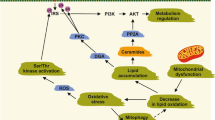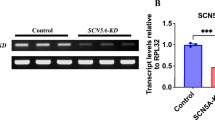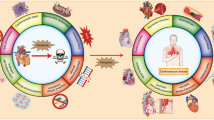Abstract
Diabetes mellitus (DM) is a major metabolic disorder currently affecting over 250 million people globally. It costs the worldwide health services almost £800 billion annually to diagnose, treat and care for patients with diabetes. DM is predicted to rise to 350 million by 2030. If left unmanaged, DM can lead to numerous long-term complications including micro- and macro-angiopathy and heart failure (HF). Most diabetics usually die as a result of HF resulting from diabetes-induced coronary artery disease and cardiomyopathy. Coronary artery disease and cardiomyopathy are normally preceded by hyperglycaemia (HG). This review examines the structural changes, which occur within the myocardium and cardiomyocytes during exposure of the heart to diabetes-induced HG and HG-induced oxidative stress. HG and the resulting oxidative stress are associated with marked myocardial hypertrophy and fibrosis compared to control heart. At the ultrastructural level, cardiomyocytes subjected to chronic HG and subsequent oxidative stress display swollen mitochondria, reduced mitochondrial number and defective myofibrils and intercalated discs. Evidence from many studies shows that both type 1 and type 2 diabetes-induced HG can cause myocardial fibrosis, mitochondriopathy, myocyte hypertrophy and deranged myofibrils. All of these structural changes may eventually result in HF if left untreated.




Similar content being viewed by others
References
Strömberg A (2005) The crucial role of patient education in heart failure. Eur J Heart Fail 7:363–369
Braunstein JBAG, Gerstenblith G, Weller W, Niefeld M, Herbert R, Wu AW (2003) Non-cardiac comorbidity increases preventable hospitalizations and mortality among Medicare beneficiaries with chronic heart failure. J Am Coll Cardiol 42:1226–1233
Kumar P, Clark M (2002) Diabetes mellitus and other disorders of metabolism. In: Kumar P, Clark M (eds) Clinical medicine, 5th edn. WB Saunders, London, pp 1069–1012
Cowie MR, Mosterd A, Wood DA, Deckers JW, Poole-Wilson PA, Sutton GC et al (1997) The epidemiology of heart failure. Eur Heart J 18:208–225
Packer M (1992) The neurohormonal hypothesis: a theory to explain the mechanism of disease progression in heart failure. J Am Coll Cardiol 20:248–254
Fedak PW, Verma S, Weisel RD, Li RK (2005) Cardiac remodeling and failure: from molecules to man (Part II). Cardiovasc Pathol 14:49–60
D’Souza A, Wood NM, Boyett M, Adeghate E, Howarth CF, Bidasee KA, Singh J (2011) Left ventricle structural remodelling in the prediabetic goto-kakizaki rat—potential role of transforming growth factor β1. Exp Physiol 96:875–888
Maytin M, Colucci WS (2002) Molecular and cellular mechanisms of myocardial remodelling. J Nucl Cardiol 9:319–327
Swynghedauw B, Delcayre C, Samuel JL et al (2010) Molecular mechanisms in evolutionary cardiology failure. Ann NY Acad Sci 1188:58–67
Martin JH, Connelly KA, Boyle A, Kompa A, Zhang Y, Kelly D, Gilbert RE, Krum H (2010) Effect of atorvastatin on cardiac remodelling and mortality in rats following hyperglycemia and myocardial infarction. Int J Cardiol 143:353–360
D’Souza A, Hussain M, Howarth CF, Woods NM, Bidasee KA, Singh J (2009) Pathogenesis and pathophysiology of accelerated atherosclerosis in the diabetic heart. Mol Cell Biochem 331:89–116
Pantos C, Mourouzis I, Markakis K, Dimopoulos A, Xinaris C, Kokkinos AD et al (2007) Thyroid hormone attenuates cardiac remodeling and improves hemodynamics early after acute myocardial infarction in rats. Eur J Cardiothorac Surg 32:333–339
Pantos C, Mourouzis I, Cokkinos DV (2011) New insights into the role of thyroid hormone in cardiac remodeling: time to reconsider? Heart Fail Rev 16:79–96
Swynghedauw B (1999) Molecular mechanisms of myocardial remodeling. Physiol Rev 79:215–262
Verny C (2007) Congestive heart failure in the elderly diabetic. Diabetes Metab 33:S32–S39
Sanchex-Bariga JJ, Rangel A, Castaneda R, Flores D, Frati AC, Ramos MA, Amato D (2001) LV diastolic dysfunction secondary to hyperglycemia in patients with type 2 diabetes. Archives Med Res 32:44–47
Doron A (2003) Cross-linking of glycated collagen in the pathogenesis of arterial and myocardial stiffening of ageing and diabetes. J Hyperten 21:3–12
Bracken NK, Singh J, Winlow W, Howarth FC (2003) Mechanism underlying contractile dysfunction in streptozotocin-induced type 1 and type 2 diabetic cardiomyopathy. In: Pierce GN, Nagano M, Zahradka P, Dhalla NS (eds) Atherosclerosis, hypertension and diabetes. Kluwer Academic Publishers, Boston, pp 387–408
Bracken NK, Woodall AJ, Howarth FC, Singh J (2004) Voltage dependence of contraction in streptozotocin-induced diabetic myocytes. Mol Cell Biochem 261:235–243
Bracken N, Howarth FC, Singh J (2006) Effects of streptozotocin-induced diabetes on contraction and calcium transport in rat ventricular cardiomyocytes. Ann NY Acad Sci 1084:208–222
Stahrenberg R, Edelmann F, Mende M et al (2010) Association of glucose metabolism with diastolic function along the diabetic continuum. Diabetologia 53:1331–1340
Adeghate E, Schattner P, Dunn E (2006) An update on the etiology and epidemiology of diabetes mellitus. Ann NY Acad Sci 1084:1–29
Goto Y, Kakizaki M, Masaki N (1975) Spontaneous diabetes produced by selective breeding of normal Wistar rats. Proc Jpn Acad Sci 51:80–85
Portha B, Serradas P, Bailbe D et al (1991) Beta-cell insensitivity to glucose in the GK rat, a spontaneous nonobese model for type II diabetes. Diabetes 40:486–491
El-Omar MM, Yang ZK, Phillips AO, Shah AM (2004) Cardiac dysfunction in the Goto-Kakizaki rat. A model of type II diabetes mellitus. Basic Res Cardiol 99:133–141
Hughes SJ, Faehling M, Thorneley CW, Proks P, Ashcroft FM, Smith PA (1998) Electrophysiological and metabolic characterization of single beta-cells and islets from diabetic GK rats. Diabetes 47:73–81
Howarth FC, Shafiullah M, Qureshi MA (2007) Chronic effects of type 2 diabetes mellitus on cardiac muscle contraction in the Goto-Kakizaki rat. Exp Physiol 92:1029–1036
Li B, Zheng Z, Wei Y, Wang M, Peng J, Kang T, Huang X, Xiao J, Li Y, Li Z (2011) Therapeutic effects of neuregulin-1 in diabetic cardiomyopathy rats. Cardiovasc Diabetol 10:69
Li CJ, Lv L, Li H, Yu DM (2012) Cardiac fibrosis and dysfunction in experimental diabetic cardiomyopathy are ameliorated by alpha-lipoic acid. Cardiovasc Diabetol 11:73
Regan TJ, Wu CF, Yeh CK, Oldewurtel HA, Haider B (1981) Myocardial composition and function in diabetes. The effects of chronic insulin use. Circ Res 49:1268–1277
Fein FS, Kornstein LB, Strobeck JE, Capasso JM, Sonnenblick EH (1980) Altered myocardial mechanics in diabetic rats. Circ Res 47:922–933
Modrak J (1980) Collagen metabolism in the myocardium from streptozotocin-diabetic rats. Diabetes 29:547–550
Shimizu M, Umeda K, Sugihara N, Yoshio H, Ino H, Takeda R, Okada Y, Nakanishi I (1993) Collagen remodelling in myocardia of patients with diabetes. J Clin Pathol 46:32–36
Kawaguchi M, Techigawara M, Ishihata T, Asakura T, Saito F, Maehara K, Maruyama Y (1997) A comparison of ultrastructural changes on endomyocardial biopsy specimens obtained from patients with diabetes mellitus with and without hypertension. Heart Vessels 12:267–274
Kuethe F, Sigusch HH, Bornstein SR, Hilbig K, Kamvissi V, Figulla HR (2007) Apoptosis in patients with dilated cardiomyopathy and diabetes: a feature of diabetic cardiomyopathy? Horm Metab Res 39:672–676
Campbell DJ, Somaratne JB, Jenkins AJ, Prior DL, Yii M, Kenny JF, Newcomb AE, Schalkwijk CG, Black MJ, Kelly DJ (2011) Impact of type 2 diabetes and the metabolic syndrome on myocardial structure and microvasculature of men with coronary artery disease. Cardiovasc Diabetol 10:80
Thompson EW (1988) Structural manifestations of diabetic cardiomyopathy in the rat and its reversal by insulin treatment. Am J Anat 182:270–282
Kita Y, Shimizu M, Sugihara N, Shimizu K et al (1991) Correlation between histopathological changes and mechanical dysfunction in diabetic rat hearts. Diabetes Res Clin Pract 11:177–188
Riva E, Andreoni G, Bianchi R, Latini R et al (1998) Changes in diastolic function and collagen content in normotensive and hypertensive rats with long-term streptozotocin-induced diabetes. Pharmacol Res 37:233–240
Ban CR, Twigg SM (2008) Fibrosis in diabetes complications: pathogenic mechanisms and circulating and urinary markers. Vasc Health Risk Manag 4:575–596
Brownlee M (2001) Biochemistry and molecular cell biology of diabetic complications. Nature 414:813–820
Brownlee M (2005) The pathobiology of diabetic complications: a unifying mechanism. Diabetes 54:1615–1625
Tschope C, Walther T, Koniger J et al (2004) Prevention of cardiac fibrosis and left ventricular dysfunction in diabetic cardiomyopathy in rats by transgenic expression of the human tissue kallikrein gene. FASEB J 18:828–835
Wilson D, Massaeli H, Russell JC, Pierce GN, Zahradka P (2003) Low matrix metalloproteinase levels precede vascular lesion formation in the JCR: LA-cp rat. Mol Cell Biochem 249:151–155
De Tombe PP (1998) Altered contractile function in heart failure. Cardiovasc Res 37:367–380
Ceriello A (2003) New insights on oxidative stress and diabetic complications may lead to a “causal” antioxidant therapy. Diabetes Care 26:1589–1596
Cai L, Li W, Wang G, Guo L, Jiang Y, Kang YJ (2002) Hyperglycemia-induced apoptosis in mouse myocardium: mitochondrial cytochrome C-mediated caspase-3 activation pathway. Diabetes 51:1938–1948
van Campenhout A, van Campenhout CM, Lagrou AR, Manuel-y-Keenoy B (2003) Transferrin modifications and lipid peroxidation: implications in diabetes mellitus. Free Radic Res 37:1069–1077
Feng Z, Hu W, Tang MS (2004) Trans-4-hydroxy-2-nonenal inhibits nucleotide excision repair in human cells: a possible mechanism for lipid peroxidation-induced carcinogenesis. Proc Natl Acad Sci USA 101:8598–8602
Seager MJ, Singal PK, Orchard R, Pierce GN, Dhalla NS (1984) Cardiac cell damage: a primary myocardial disease in streptozotocin-induced chronic diabetes. Br J Exp Pathol 65:613–623
Hsiao YC, Suzuki K, Abe H, Toyota T (1987) Ultrastructural alterations in cardiac muscle of diabetic BB Wistar rats. Virchows Arch A Pathol Anat Histopathol 411:45–52
Pierce GN, Dhalla NS (1985) Heart mitochondrial function in chronic experimental diabetes in rats. Can J Cardiol 1:48–54
Raza H, Prabu SK, Robin MA, Avadhani NG (2004) Elevated mitochondrial cytochrome P450 2E1 and glutathione S-transferase A4–4 in streptozotocin-induced diabetic rats: tissue-specific variations and roles in oxidative stress. Diabetes 53:185–194
Santos DL, Palmeira CM, Seiça R, Dias J, Mesquita J, Moreno AJ, Santos MS (2003) Diabetes and mitochondrial oxidative stress: a study using heart mitochondria from the diabetic Goto-Kakizaki rat. Mol Cell Biochem 246:163–170
Valensi PE, Johnson NB, Maison-Blanche P, Extramania F, Motte G, Coumel P (2002) Influence of cardiac autonomic neuropathy on heart rate dependence of ventricular repolarization in diabetic patients. Diabetes Care 25:918–923
Pfister R, Cairns R, Erdmann E, Schneider CA, PROactive investigators (2011) Prognostic impact of electrocardiographic signs in patients with Type 2 diabetes and cardiovascular disease: results from the PROactive study. Diabet Med 28:1206–1212
Pierce GN, Dhalla NS (1981) Cardiac myofibrillar ATPase activity in diabetic rats. J Mol Cell Cardiol 12:1063–1069
Pierce GN, Dhalla NS (1985) Mechanisms of the defect in cardiac myofibrillar function during diabetes. Am J Physiol 248:E170–E175
Melchior TM, Seibaek MB, Sajadieh A (1998) Coronary atherosclerosis or diabetic cardiomyopathy? Pathoanatomic changes of blood vessels, nerves and myocardium in patients with diabetes mellitus. Ugeskr Laeger 160:1307–1311
Cade WT (2008) Diabetes-related microvascular and macrovascular diseases in the physical therapy setting. Phys Ther 88:1322–1335
Kirpichnikov D, Sowers JR (2001) Diabetes mellitus and diabetes-associated vascular disease. Trends Endocrinol Metab 12:225–230
Malmberg K, Yusuf S, Gerstein HC, Brown J, Zhao F, Hunt D, Piegas L, Calvin J, Keltai M, Budaj A (2000) Impact of diabetes on long-term prognosis in patients with unstable angina and non-Q-wave myocardial infarction: results of the OASIS (Organization to Assess Strategies for Ischemic Syndromes) Registry. Circulation 102:1014–1019
Manson JE (2013) The kronos early estrogen prevention study. Womens Health (Lond Engl) 9:9–11
Brown RA, Filipovich P, Walsh MF, Sowers JR (1996) Influence of sex, diabetes and ethanol on intrinsic contractile performance of isolated rat myocardium. Basic Res Cardiol 91:353–360
Hu FB, Stampfer MJ, Solomon CG, Liu S, Willett WC, Speizer FE, Nathan DM, Manson JE (2001) The impact of diabetes mellitus on mortality from all causes and coronary heart disease in women: 20 years of follow-up. Arch Intern Med 161:1717–1723
Beckman JA, Creager MA, Libby P (2002) Diabetes and atherosclerosis: epidemiology, pathophysiology, and management. JAMA 287:2570–2581
Sabatier F, Darmon P, Hugel B, Combes V, Sanmarco M, Velut JG, Arnoux D, Charpiot P, Freyssinet JM, Oliver C, Sampol J, Dignat-George F (2002) Type 1 and type 2 diabetic patients display different patterns of cellular microparticles. Diabetes 51:2840–2845
Djaberi R, Schuijf JD, Boersma E, Kroft LJ, Pereira AM, Romijn JA, Scholte AJ, Jukema JW, Bax JJ (2009) Differences in atherosclerotic plaque burden and morphology between type 1 and 2 diabetes as assessed by multislice computed tomography. Diabetes Care 32:1507–1512
Pierce GN, Russell JC (1997) Regulation of intracellular Ca2q in the heart during diabetes. Cardiovasc Res 34:41–47
Adeghate E (2004) Molecular and cellular basis of the aetiology and management of diabetic cardiomyopathy: a short review. Mol Cell Biochem 261:187–191
Wang CC, Reusch JE (2012) Diabetes and cardiovascular disease: changing the focus from glycemic control to improving long-term survival. Am J Cardiol 110(9 Suppl):58B–68B
Wang B, Tedder ME, Perez CE, Wang G, de Jongh Curry AL, To F, Elder SH, Williams LN, Simionescu DT, Liao J (2012) Structural and biomechanical characterizations of porcine myocardial extracellular matrix. J Mater Sci Mater Med 23:1835–1847
Adeghate E (1998) Host-graft circulation and vascular morphology in pancreatic tissue transplants in rats. Anat Rec 251:448–459
Adeghate E, Kalasz H, Veress G, Tekes K (2010) Medicinal chemistry of drugs used in diabetic cardiomyopathy. Curr Med Chem 17:517–551
Acknowledgments
The authors thank Mr. Rashed Hameed and Mr. Saeed Tariq for technical assistance and Dr. Alicia D’Souza for help on cardiac fibrosis.
Conflict of interest
None.
Author information
Authors and Affiliations
Corresponding author
Rights and permissions
About this article
Cite this article
Adeghate, E., Singh, J. Structural changes in the myocardium during diabetes-induced cardiomyopathy. Heart Fail Rev 19, 15–23 (2014). https://doi.org/10.1007/s10741-013-9388-5
Published:
Issue Date:
DOI: https://doi.org/10.1007/s10741-013-9388-5




